
Gauntlet Legends is an arcade game released in 1998 by Atari Games and Midway Games. It is a fantasy themed hack and slash styled dungeon crawl game, a sequel to 1985's popular Gauntlet and 1986's Gauntlet II and marks the final game in the series to be produced by Atari Games. Its unusual features for an arcade game included passwords and characters that could be saved, enabling players to play over the course of a long period.

Cruis'n Exotica is a 1999 racing game developed for arcades by Midway Games. The game is a sequel to Cruis'n World and is the third entry in the Cruis'n series.

Ready 2 Rumble Boxing is a boxing video game developed by Midway Studios San Diego, and published by Midway in 1999 for the Dreamcast, PlayStation, Game Boy Color, and Nintendo 64. The success of the Dreamcast version led to it becoming one of the few Sega All Stars titles.
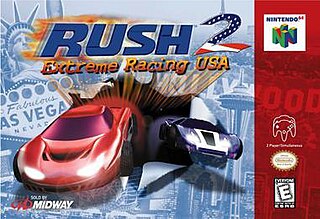
Rush 2: Extreme Racing USA is a racing video game developed by Atari Games and published by Midway exclusively for the Nintendo 64 video game console. It was released on November 11, 1998, in North America, and February 4, 1999, in Europe. Rush 2: Extreme Racing USA is a sequel to San Francisco Rush: Extreme Racing, and the second game in the Rush series.
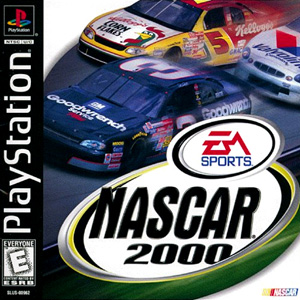
NASCAR 2000 is a racing simulator video game developed by Stormfront Studios and published by EA Sports.

NBA Showtime is a basketball arcade game released by Midway in 1999, featuring teams and players from the National Basketball Association (NBA). The game is modeled after the NBA presentations on NBC and takes its name from NBC's NBA pregame show. It is the successor to Midway's previous basketball titles NBA Hangtime and NBA Jam and is the first in the series to have fully 3-D polygonal graphics, featuring real uniforms for all teams. Showtime was also featured in a dual game cabinet along with NFL Blitz 2000 that Midway dubbed the "SportStation." Midway followed up the game with the console exclusive NBA Hoopz.
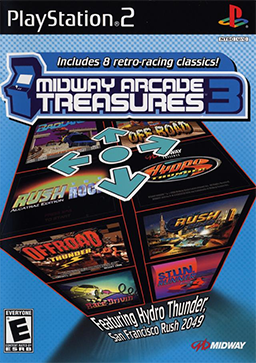
Midway Arcade Treasures 3 is the third and final compilation of classic arcade games published by Midway for the GameCube, PlayStation 2, and Xbox. This compilation includes 8 racing games that were not in the 2003 and 2004 releases Midway Arcade Treasures and Midway Arcade Treasures 2. Like the first and second installments, however, the Xbox version is not compatible with the Xbox 360. Unlike the other installments in the Midway Arcade Treasures series, it is rated E for Everyone by the ESRB. It also differs from the other installments by focusing on one specific genre, while the first two featured games from a wide variety of genres.
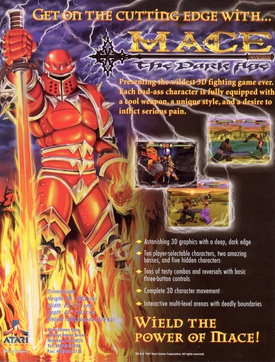
Mace: The Dark Age is a fighting video game released by Atari Games for arcade machines in 1997 and later ported by Midway Games to the Nintendo 64. Like many fighting games of the time, its style is marked by extreme violence, with characters graphically slaying defeated opponents. Utilizing 3dfx Voodoo chips for the hardware, the game received attention for its cutting-edge graphics and turned Atari a profit in the arcades. Critical response to the gameplay was much less enthusiastic.

Ms. Pac-Man Maze Madness is a maze chase video game developed and published by Namco for the PlayStation in 2000. It was later released for the Nintendo 64, Dreamcast, and Game Boy Advance. A remake of Ms. Pac-Man (1982), players control the titular character in her quest to stop a witch named Mesmerelda from stealing the Gems of Virtue. The game was well-received upon release, with critics applauding its simplicity and faithfulness to the arcade original. A sequel was in development around 2006, but was cancelled for unknown reasons.

Hydro Thunder is an arcade inshore powerboat racing video game originally released by Midway Games in February 1999 and later released for the Sega Dreamcast as a launch title later that year. It was also released for the PlayStation and Nintendo 64 in early 2000. This game is part of Midway's Thunder series of racing games, which includes Offroad Thunder, 4 Wheel Thunder, and Arctic Thunder. Hydro Thunder Hurricane, a sequel to Hydro Thunder, was later released for the Xbox 360 on July 27, 2010 on Xbox Live Arcade.
Rush is a series of racing video games developed by American-based company Atari Games and published by Atari Games and Midway Games for home consoles. The series debuted worldwide in 1996. The games consist mainly of racing with various cars on various tracks while players perform stunts in races.

WWF Attitude is a professional wrestling video game based on the World Wrestling Federation released by Acclaim Entertainment in 1999 for the PlayStation and Nintendo 64. A slightly enhanced port of the game was later released for the Dreamcast, as well as a handheld version for the Game Boy Color. The game is named after the WWF's then-current "Attitude" marketing campaign, with the tagline "Get it" also being used on company programming during that period.

California Speed is a racing video game developed and published by Atari Games. The game was first released in arcades in 1998 and was ported to the Nintendo 64 in 1999 by Midway. The Nintendo 64 version of the game contains support for the Controller Pak and the Rumble Pak.

International Track & Field 2000 is a track and field game for PlayStation in 1999 and Nintendo 64 in 2000. It was released in Europe under the name International Track & Field: Summer Games on the Nintendo 64 and Game Boy Color, and in Japan as Ganbare! Nippon! Olympics 2000, where it was licensed by the Japanese Olympic Committee. Versions were also released for the Sega Dreamcast, PlayStation 2, and Game Boy Color as ESPN International Track & Field in North America. Maurice Greene (sprinter), a former men's WR holder in the 100M dash, is the cover athlete.
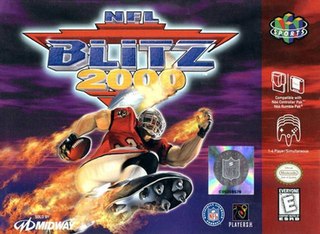
NFL Blitz 2000 is a video game released in the arcades in 1999 and then ported to the PlayStation, Nintendo 64, Dreamcast, Microsoft Windows, and Game Boy Color. It is the third game in the NFL Blitz series.
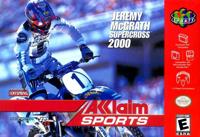
Jeremy McGrath Supercross 2000 is a motocross racing video game developed by Acclaim Studios Salt Lake City and published by Acclaim Entertainment under their Acclaim Sports label for Nintendo 64, Game Boy Color, PlayStation and Dreamcast. It features eight stadium tracks, eight outdoor tracks, and an option for players to create their own custom tracks. In addition to having a racing game mode, players could perform dirt bike tricks in a stunt mode.
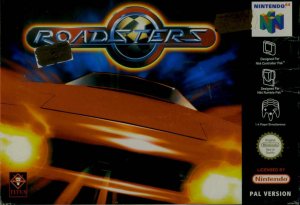
Roadsters is a racing game released by Titus Software for Nintendo 64 in 1999, and for PlayStation, Dreamcast and Game Boy Color in 2000. It is a car racing game that features both licensed cars from manufacturers and unlicensed cars from imaginary manufacturers that are based on and bear great resemblance to their equivalent, real car models. The game also includes a multi-player mode supports up to 2 human players that can compete in any of the available circuits with 4 more CPU controlled racers. A PlayStation 2 version was originally planned to release on April 11, 2001.
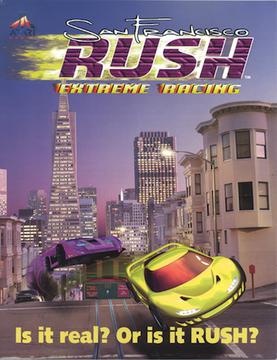
San Francisco Rush: Extreme Racing is a video game developed and published by Atari Games. This game was first released in arcades in 1996 and was ported to Nintendo 64 in 1997 and the PlayStation in 1998. San Francisco Rush: Extreme Racing is the first game in the Rush series.

NFL Blitz 2001 is a video game developed and published by Midway for the Dreamcast, PlayStation, Nintendo 64 and Game Boy Color in 2000.

NFL Blitz is an American football video game developed and published by Midway for the arcade in 1997, the first game in the NFL Blitz series. The development team was headed by Mark Turmell and Sal Divita, who were known for being behind NBA Jam, and NFL Blitz was a deliberate attempt to translate the exaggerated arcade-style approach of NBA Jam to the football realm. The game was ported to the PlayStation, Nintendo 64, Windows, and Game Boy Color in 1998. The cover athlete for the game was then Pittsburgh Steelers quarterback Kordell Stewart.




















